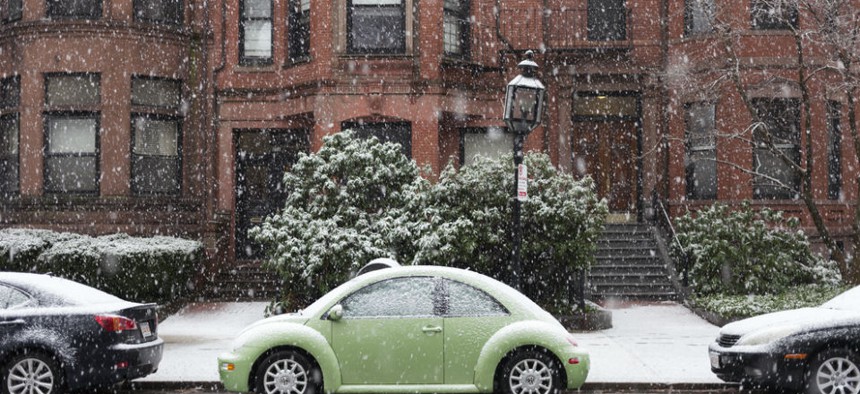No More Winter 'Dibs' on Parking Spots

sunsinger / Shutterstock.com
In Boston's South End, a debate over post-snow parking rights shows that no one should "own" any part of public streets.
This winter, Boston's South End neighborhood embarks on a bold experiment in social engineering. With the mayor's blessing, The Boston Globe reports, the neighborhood has banned the popular practice of "dibs." What happens next could undermine Boston's reputation for extreme social grace under foul-weather pressure.
Kidding, of course. Boston in winter is a place that would make Cormac McCarthy blush. Cars parked in saved spaces after a blizzard in February 2013saw their tires slashed by the angry residents who had initially shoveled the spaces out—and that's not even an outlier. They had broken the code of winter-parking dibs: Shoveling out a parking space entitles the shoveler to that specific space, according to popular convention. The claim is signaled by putting something in the space as a placeholder. (A chair, a bin, anything will do.)
The administration of Boston Mayor Martin J. Walsh recognizes space-saving as a "guideline," despite the fact that this guideline is enforced by vandalism.
But now, South End, which may have learned of the practice from the fearsome vigilance of South Boston residents, is turning a page. "We Don't Do 'Dibs' Here," read posters hanging in South End now, sounding as much like an advisory notice to South End residents as to hapless visitors who may be trying to find parking there.
It's hard to imagine that any neighborhood association can succeed (in this case, the South End Forum) where even mayor fears to tread. Former Mayor Thomas M. Menino accepted the practice of space-saving, although his administrationlimited it to 48 hours from the end of a snow emergency. Which is weird, when you think about it: a city official acknowledging that, for two days after a snowstorm, citizens will key one another's cars over parking spots.
When Menino's successor, Mayor Walsh, embraced dibs, he also agreed to the contradictions that come with officially embracing an unofficial policy that surrenders a fraction of the state's monopoly on legitimate violence. Here is a real sentence printed by The Boston Globe: "[Walsh administration spokeswoman Kate] Norton said citizens should call the mayor’s hot line if their space-saver is moved, though the city will not come out and do anything about it." (Well then, by God, who will?)
The practice of dibs is so thoroughly integrated into Boston culture that drivers sometimes claim spaces before snowstorms. But Boston is hardly alone in the practice: There's even a book about space-saving in Chicago. And the psychic toll inflicted by snow on city-dwellers is so severe that even right-minded people such as former CityLab-er Emily Badger agree that property rights are won at the handle of a snow shovel.
The real problem with dibs is not the idea that parking rights emerge from the labor of snow shovelers, but rather the notion that parking spaces in front of homes are obliged to residents. Cities shouldn't embrace any "guidelines" that suggests that homeowners own a portion of the street, and they for damn sure shouldn't tolerate folks bashing in the windows of cars parked in "their" spaces.
Boston and other cities that embrace space-saving—Philadelphia, Pittsburgh, and Chicago, principally—ought to do as much as they can to discourage it. Dibs extends the awful logic that says that homeowners own the street parking in front of their homes to any spot where they happened to have parked their cars. Knowing instead that they might have to shovel out a new spot to park whenever they drive might keep drivers off the road or encourage them to make use of discount neighborhood garages or alternative solutions.
At the very least, though, South End's decision might save its residents the costs of violence and vandalism. If the rest of Boston catches on, that is.
(Image via sunsinger / Shutterstock.com )





